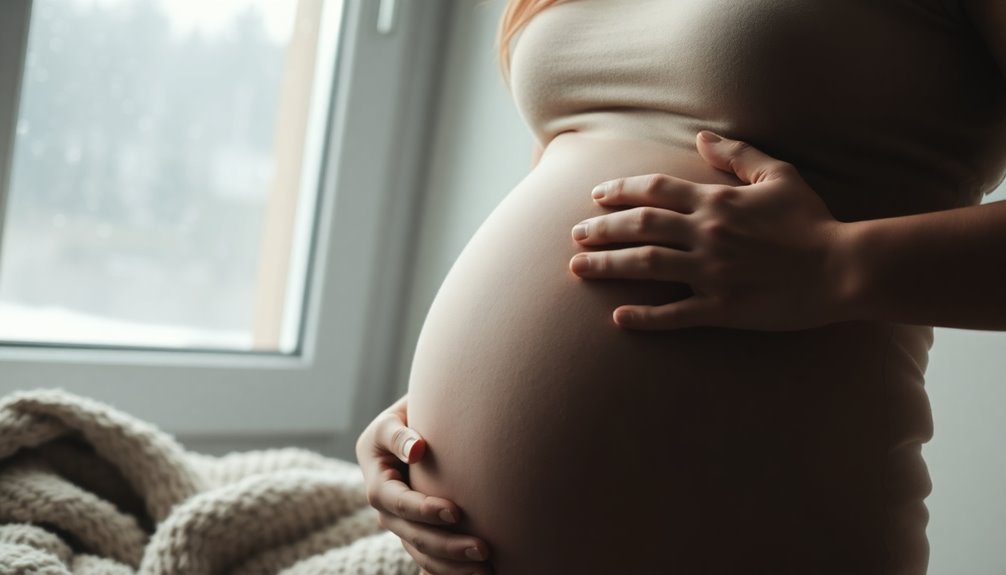Chills and shivering during pregnancy can catch you off guard. They often result from hormonal changes, infections, or even the early signs of labor. In the 1st trimester, your body's adjusting temperature regulation can create chills. By the 3rd trimester, chills might indicate labor onset. It's essential to monitor accompanying symptoms, like fever or unusual fatigue. If you're curious about the reasons behind these chills and when to seek help, there's more to discover.
Key Takeaways
- Chills during pregnancy can result from hormonal changes, particularly increased progesterone, affecting body temperature regulation, especially in the 1st trimester.
- Viral infections can cause chills; watch for accompanying symptoms like fever, sore throat, or cough to determine severity.
- Infections like UTIs, influenza, or chorioamnionitis may present with chills and require immediate medical attention if accompanied by fever.
- Persistent chills beyond a few days, especially with unusual fatigue or gastrointestinal symptoms, may indicate a serious issue needing consultation.
- Regular prenatal check-ups and awareness of symptoms are essential for early identification and management of potential health concerns during pregnancy.
Understanding Chills in the 1st Trimester of Pregnancy

During the first trimester of pregnancy, many women experience chills and shivering, often without a fever.
These chills during pregnancy can be surprising, especially when they occur in the evening or at night despite being warm.
They're mainly caused by hormonal changes, particularly increased progesterone levels, which affect your body temperature regulation. This can lead to confusion, with some women mistakenly thinking they're getting a cold.
Remember, experiencing chills is usually a normal part of early pregnancy, but it's important to monitor your overall health. Common types of cold medications can sometimes exacerbate these symptoms, so it's crucial to be aware of what you are taking.
If you're concerned or if the chills persist, consult your doctor. Staying informed and aware can help you navigate this fascinating yet sometimes perplexing time in your life.
Chills in the 2nd Trimester: When to Worry

As you move into the second trimester, you might notice that chills become less frequent as your body adjusts to the hormonal shifts.
While some chills can be normal pregnancy-related symptoms, it's important to know when to worry. Here are some signs to watch for:
It's essential to recognize when chills during pregnancy may signal a more serious issue. Stay vigilant for concerning symptoms.
- Persistent chills: If chills continue for several days without relief.
- Accompanying fever: A high temperature might indicate an infection.
- Unusual fatigue: Feeling overly tired can signal potential issues.
- Other concerning symptoms: Nausea, vomiting, or severe discomfort warrant attention.
If you experience any of these signs, don't hesitate to contact your doctor.
Understanding the difference between normal symptoms and those indicating an infection is vital for your health and your baby's.
Identifying Chills as a Cold or Flu Symptom

When you feel chills during pregnancy, it's important to recognize if they're part of a cold or flu.
Pay attention to other symptoms like a sore throat or cough, which can indicate a common cold that usually resolves on its own.
However, if you develop a fever over 38.8 °C, don't hesitate to reach out to your healthcare provider for guidance.
Recognizing Cold Symptoms
How can you tell if those chills are just a passing discomfort or a sign of a cold or flu? Recognizing cold symptoms is vital, especially during pregnancy.
Chills can accompany a viral infection, and you should be aware of other symptoms. If you experience:
- A sore throat
- A runny nose
- A cough
- Fever exceeding 38.8 °C
These symptoms indicate you might be more than just feeling cold during pregnancy.
Mild viral infections usually stabilize within 2-3 days, but persistent symptoms could signal serious conditions. If you're unsure, it's always best to call your doctor for guidance.
Staying alert to these signs can help guarantee a healthier pregnancy.
Managing Flu During Pregnancy
Chills during pregnancy can signal more than just a fleeting chill; they often point to the possibility of a cold or flu.
If you experience chills, pay attention to other flu symptoms like a sore throat, runny nose, or cough. Remember, pregnant individuals face a higher risk of severe flu due to suppressed immune systems, so monitor for fever or body aches closely.
Chills from the flu tend to hit suddenly and can be more intense than those from a common cold, which usually resolves within 3 to 14 days.
If your chills come with a fever over 38.8 °C, seek medical consultation immediately.
For milder symptoms, consider home remedies like rest and warm fluids to aid your recovery.
Chills and Pre-Eclampsia: What You Need to Know

While you might experience chills during pregnancy, it's important to know that they aren't linked to pre-eclampsia.
Instead, keep an eye out for these key symptoms of pre-eclampsia:
- High blood pressure – Elevated readings can indicate a problem.
- Protein in urine – A sign your kidneys might be affected.
- Swelling – Unusual swelling in your hands and face should raise concerns.
- Consultation – Always consult your healthcare provider if you notice unusual symptoms.
Chills in the 3rd Trimester: Signs of Labor?

If you're experiencing chills in your third trimester, it could signal the onset of labor as your body prepares for childbirth.
You might also notice gastrointestinal symptoms like nausea or diarrhea accompanying those chills.
Keep an eye on any persistent chills and consult your physician if you're concerned.
Chills Indicating Labor Onset
As your body approaches the final stages of pregnancy, you might notice chills without a fever, which can indicate the onset of labor. These chills often signal that your body is preparing for the significant changes ahead.
Here are some things to keep in mind:
- Chills without fever can be normal during this time.
- They may act as a cleansing mechanism before labor.
- Be aware of any additional symptoms that could arise.
- If you experience persistent chills or concerning symptoms, consult your physician.
While chills can be part of the labor process, keeping track of your body's signals is essential.
Always prioritize your health and discuss any concerns with your physician for proper monitoring and care.
Accompanying Gastrointestinal Symptoms
Chills during the third trimester can sometimes come with gastrointestinal symptoms like nausea or diarrhea, signaling your body's preparation for labor.
As your pregnancy progresses, hormonal changes may cause these symptoms to arise together, making it important to pay attention to how you feel.
Occasional chills without fever can be a normal response as your body readies itself for childbirth, but persistent or concerning symptoms should prompt a conversation with your healthcare provider.
Understanding that chills may indicate labor signs is essential as you approach your delivery date.
Monitor the frequency and intensity of your gastrointestinal symptoms alongside chills to guarantee you're aware of any changes that might require medical attention.
When to Consult Physician
When should you consider reaching out to your physician about chills in the third trimester? While occasional chills can be normal, it's crucial to monitor your symptoms closely.
If you experience any of the following, don't hesitate to consult your doctor:
- Persistent chills that don't go away.
- Significant discomfort or pain alongside the chills.
- Changes in fetal movement, such as decreased activity.
- Gastrointestinal symptoms like nausea or diarrhea that worsen.
These signs could indicate your body's readiness for labor or other concerns.
Common Causes of Fever and Chills During Pregnancy

Fever and chills during pregnancy can signal underlying infections that require your attention. One common cause is urinary tract infections (UTIs), which affect about 8% of pregnant individuals.
If you experience fever alongside chills, it's vital to consult your doctor promptly, as these symptoms can indicate a temporary infection that needs medical attention.
Influenza is another potential culprit, and it can lead to severe illness if not addressed. While symptoms of a common cold may resolve in a few days, prolonged chills or fever exceeding 38.8 °C can pose risks to both you and your baby, particularly in early pregnancy.
Don't ignore these signs; prioritizing your health is essential for a safe pregnancy.
Serious Infections Leading to Fever and Chills

While experiencing chills and fever during pregnancy can be alarming, understanding the potential serious infections behind these symptoms is essential.
Experiencing chills and fever during pregnancy can be concerning; recognizing serious infections is crucial for your health.
Here are some serious infections to be aware of:
- Urinary Tract Infections (UTIs): Affecting about 8% of pregnant individuals, they can lead to severe complications if untreated.
- Influenza: This viral infection can cause rapid onset of fever, chills, and body aches, increasing the risk of severe illness.
- Chorioamnionitis: A bacterial infection of fetal membranes requiring urgent medical attention and antibiotic treatment.
- Listeriosis: Resulting from contaminated food, it's marked by fever and chills and can cause severe complications.
Stay vigilant, and don't hesitate to seek medical help if you experience these symptoms.
Managing Cold Sensations: When to Seek Help

Experiencing cold sensations during pregnancy can be unsettling, especially if they persist or are accompanied by other symptoms.
You need to know that chills alongside a fever over 38.8 °C warrant prompt consultation with your doctor to rule out infections.
Keep an eye out for additional symptoms like nausea, vomiting, or unusual fatigue, as these could signal a more serious issue.
If you're feeling chills with signs of dehydration or gastrointestinal distress, it's essential to seek help immediately.
Regular check-ups can uncover underlying conditions such as iron deficiency or thyroid gland issues.
Finally, if feelings of coldness trigger anxiety or panic attacks, don't hesitate to talk to your doctor for management strategies and reassurance.
Frequently Asked Questions
Why Do I Suddenly Feel Cold and Shaking During Pregnancy?
If you suddenly feel cold and start shaking during pregnancy, it could be due to hormonal changes, particularly increased progesterone.
Many expectant mothers experience chills, especially in the evenings, which might feel like the onset of a cold.
As your body adjusts, these chills usually lessen by the second trimester.
However, if they persist or you have other symptoms, it's best to consult your healthcare provider for a thorough evaluation.
Is It Normal to Be in Shock When You Find Out Your Pregnant?
Did you know that about 50% of pregnancies are unintended?
It's completely normal to feel shocked when you find out you're pregnant. You might experience a whirlwind of emotions—excitement, anxiety, and even confusion.
These feelings often stem from hormonal changes and the unexpected nature of the news. Remember, you're not alone; many women go through this.
Talk to someone you trust to help process your feelings and ease the change.
What Are 5 Warning Signs of a Possible Problem During Pregnancy?
During pregnancy, it's essential to be aware of warning signs that could indicate problems.
If you experience persistent chills and fever over 38.8 °C, seek medical help immediately.
Severe abdominal pain with bleeding, sudden swelling of hands or face, or changes in fetal movement should also prompt a call to your healthcare provider.
Finally, if you're severely dehydrated, unable to keep fluids down, get evaluated promptly to guarantee your safety and your baby's well-being.
What Are Shocking Pregnancy Symptoms?
When you're pregnant, you might experience some surprising symptoms.
Aside from the usual morning sickness, you could face unusual cravings or heightened sense of smell.
You may also notice skin changes like darkening or stretch marks.
Some women report mood swings or heightened emotions, which can catch you off guard.
It's crucial to stay connected with your healthcare provider to discuss any shocking symptoms, ensuring both you and your baby remain healthy throughout your pregnancy.
Conclusion
In summary, experiencing chills during pregnancy can feel like a rollercoaster ride—unexpected and sometimes alarming. Whether it's due to hormonal changes, infections, or even the onset of labor, knowing when to seek help is essential. Trust your instincts and listen to your body; it's your best guide. If chills persist or come with other symptoms, don't hesitate to reach out to your healthcare provider. You deserve peace of mind on this incredible journey!









